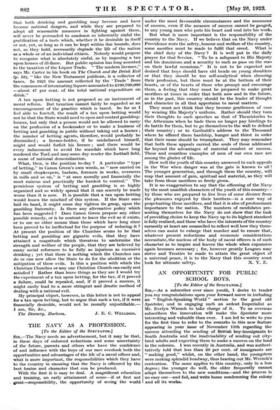THE NAVY AS A PROFESSION.
[To the Editor of the SPECTATOR.] Sia,—The Navy needs no advertisement, but it may be that, in these days of enforced reductions and some uncertainty of the future, parents and others who have the confidence of and influence with the boys of our race overlook both the opportunities and advantages of the life of a naval officer and, what is more important, the responsibilities which they have to the country in ensuring that the Navy is officered by the best :brains and character that can be produced.
With the first it is easy to deal. A magnificent education and training, an early attainment of some—if at first not .great—responsibility, the opportunity of seeing the world under the most favourable circumstances and the assurance of success, even if the measure of success cannot be gauged, to any young man who puts his heart and soul into his work.
But what is more important is the responsibility of the country to the Navy. If we believe that on the Navy under Providence rests the safety, honour and welfare of the country., some sacrifice must be made to fulfil that creed. What is the chief duty of the Navy ? It is well put in the daily prayer for that Service. " To be a safeguard to His Majesty and his dominions and a security to such as pass on the seas on their lawful occasions." It is not to be expected nor desired that boys should have old heads on young shoulders or that they should be too self-analytical when choosing their profession, but there must be at the bottom of their hearts, or of the hearts of those who prompt and encourage them, a feeling that they must be prepared to make great sacrifices at times in order that both now and in the future, as in the past, this country should be the leader of thought and character in all that appertains to naval matters.
They must not think that they become gentlemen of ease by wearing His Majesty's uniform. Rather should they turn their thoughts to such speeches as that of Themistocles to the Athenians when he bade them no longer pay hirelings to do battle for them, but to go themselves to the wall to defend their country ; or to Garibaldi's address to the Thousand where he offered them hardship, hunger and thirst in order that their cause should be triumphant. They may remember that both these appeals carried, the souls of those addressed far beyond the advantages of material comfort or success. These and countless examples of men of our own race are among the glories of life.
How well the youth of this country answered to such appeals in the War when danger was at the gate is known to all ! The younger generation, and through them the country, will reap that amount of gain, spiritual and material, as they will take from those sacrifices so freely given.
It is no exaggeration to say that the officering of the Navy by the most unselfish characters of the youth of this country-- by those who are prepared to live lives of some divorce from the pleasures enjoyed by their brothers—is a sure way of perpetuating those sacrifices, and that it is also of predominant importance to the nation. The numbers of candidates pre- senting themselves for the Navy do not show that the- task of providing choice to keep the Navy up to its highest standard is fully realized, and those who have the interests of the country earnestly at heart are counselled to reflect well how they them- selves can assist to enlarge that number and to ensure that, whatever present reductions and economic considerations necessitate, the nucleus of the body of naval officers is of such character as to inspire and leaven- the whole when expansion again becomes necessary ; for, however greatly Leagues may strive and Treaties be made to attain the great object of a universal peace, it is to the Navy that this country must










































 Previous page
Previous page